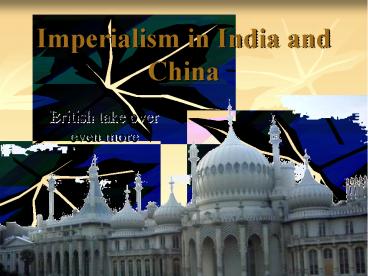Imperialism in India and China - PowerPoint PPT Presentation
Title:
Imperialism in India and China
Description:
Sepoy Rebellion Sepoy- Indian soldier in the British Army British attempt to impose European and Christian customs Immediate Cause: ... – PowerPoint PPT presentation
Number of Views:88
Avg rating:3.0/5.0
Title: Imperialism in India and China
1
Imperialism in India and China
- British take over even more
2
Reasons Why
- By 1763 British had driven rival France out of
India - Conquest facilitated by
- Military inferiority of India
- Languages over a dozen main languages and 200
dialects - Religion 20 Muslim, 80 Hindu bitterly
antagonistic toward each other - Caste System kept people from cooperating
- Political divisions over 600 states
3
(No Transcript)
4
British Influence in India
- Because of the Industrial Revolution, sea routes
replace overland routes - 1600- East India Company (Britain) is formed,
which built trading posts and forts in India - French East India Company does the same, and the
French challenge the British for control - 1757-Battle of Plassey- East India Co. defeats
the French East India Co. by using British and
Indian soldiers - British Government in India was known as the Raj
5
Benefits(?) of British Raj
- Education reforms- new universities and schools
- Irrigation projects
- Reformed police and judicial system
- Encouraged cotton industry
- Built railroads, telegraph lines, canals, and
roads across the country
6
Harmful Effects
- Indians begin to show unrest
- British discriminate against the natives
- Changed ancient Indian ways
- Grow cotton, not wheat
- Led to the starvation and death of millions of
Indians.
7
Sepoy Rebellion
- Sepoy- Indian soldier in the British Army
- British attempt to impose European and Christian
customs - Immediate Cause
- British bullets are greased with the fat of cows
(offended Hindus) and pigs (offended Muslims) - Sepoys had to use their teeth to open the
packages - Sepoys revolt for 1 year
- Many British are killed, and kill thousands of
Indians in return - 1858-Parliament removes East India Company, and
send in viceroy to rule for monarch
8
Can they do that?
- 1876, after Disraeli secures Suez Canal,
Parliament declares Queen Victoria the Empress of
India - India is known as the Brightest Jewel of the
British Empire
9
Results of Sepoy Rebellion
- General Unhappiness with British rule
- Indians outraged by food shortages and other
problems - Indians want self-rule
- 1885-Indian National Congress
- Greater role for Indians in their government
- Ironically, the people pushing for the INC were
Indians who had been educated in the British
schools and felt a strong nationalistic sentiment
10
Dailies
- What is the name of the racial system in India?
- Name two benefits of British rule in India.
- Name two harmful effects of their rule.
- What was the Sepoy Rebellion?
- What were the results of the Sepoy Rebellion?
11
So, Whats up with China?
- 1644 Qing Dynasty (Manchus) take over Ming
- Lifted restrictions on foreign travel, began
international trade - China attracted Europeans because
- Huge population market cheap labor
- Mineral resources
- Luxury goods tea and silk
- Manchus lacked military power
12
Dont do Drugs
- British were paying tons of silver for Chinese
luxury goods - Began selling Indian Opium (much better quality)
to China for silver - Trade Reversal
- Millions of Chinese became addicted, affected
both work and families
13
Opium War
- Qing emperor tried to block Opium trade
- War broke out in 1839
- Treaty of Nanking (1842)
- Ended war
- Hong Kong British colony, opened up 5 more ports
to foreigners (not just Canton), by 1900 over 90
ports open to foreigners - Opium continued to enter China
- Foreign Spheres of influence drawn up in China
14
US in China
- US could not get a foothold because of the
spheres of influence - Came up with Open Door Policy which proposed
equal trade with China for all nations - Other Imperialist nations did not accept, but
earned US good relations with China
15
Revolution in Qing China
- Manchus
- Kept civil service exams
- Female infanticide increased
- Women confined to traditional duties
- Chinese men forced to distinguish themselves from
foreigners by wearing queue, braided ponytail - Gap between rich and poor grew
- men of nobility let fingernails grow extremely
long to show they did not have to work
16
Decline of Qing
- By end of 18th C.,
- Civil service exam riddled with bribery
- Dams, bridges, canals, etc fallen to disrepair
- Bandits a problem
- Opium problem
17
Rebellions
- Many rebellions broke out between 1850s and 1860s
- Taiping Rebellion was one of them, promoted
social reform, womens rights, and land
redistribution - Scholar-gentry ended the rebellion
18
Boxer Rebellion
- 1898-1901
- Boxers were Chinese Manchus
- Uprising to drive out all foreigners
- International force put down rebellion (Europe,
US, and Japan) - Ended Qing rule
19
Chinese Republic (1911-1912)
- Sun Yat-Sen
- Leader during Taiping Rebellion
- Peoples Livelihood Wanted benefits for peasants
and workers - Nationalism Freedom from foreign imperialists
- Democracy Elect officials
- 1911 overthrew Qing
20
Dailies Imperialism in China
- Who was Sun Yat-sen?
- Why did the Chinese have to wear a queue under
the rule of the Qing? - Where were the Qing from?
- What was the goal of the Boxer Rebellion?
- Why did an international force put down the Boxer
Rebellion?































